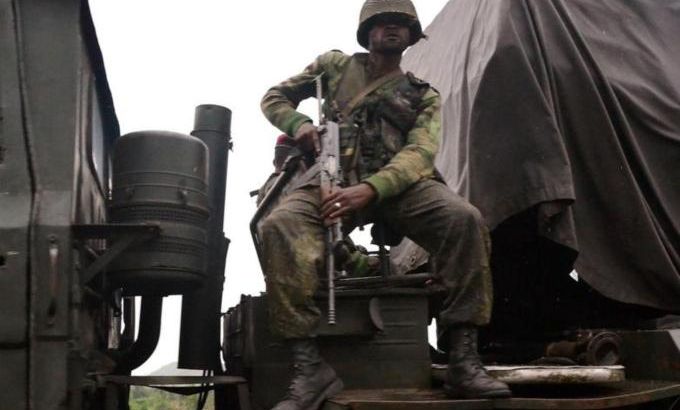Congolese armed forces occupy rebel positions
DR Congo’s government troops take strategic hills overlooking eastern town of Goma as rebel fighters withdraw.

Government troops in the Democratic Republic of Congo have occupied strategic locations in the hills overlooking the eastern city of Goma, as rebel M23 fighters withdrew.
The M23 rebels, who have fought an 18-month uprising in the eastern borderlands of DR Congo, said they quit the Kibati hills to allow an independent investigation into shelling that has killed civilians in Goma and the lakeside town of Gisenyi in neighbouring Rwanda.
The Congolese troops, backed by an armed UN force with an expansive mandate, took the positions on Saturday.
Congo’s army troops have been buoyed by the intervention of a new UN brigade fighting alongside them to drive back the M23 rebels. “We won!” they chanted in Kibati, which was, until Thursday, a rebel outpost on the frontline overlooking Goma.
“They did not leave by choice, they were confronted with the power of the army,” Lieutenant Colonel Olivier Hamuli, a spokesman for Congo’s armed forces, told reporters.
Rebel threat
The rebels, however, said on Saturday that they would retake control of the area if the government refused to halt its offensive and begin negotiations.
Bertrand Bisimwa, M23’s civilian president, said that Friday’s decision for a “unilateral ceasefire” and
withdrawal was aimed at “creating a favourable climate” for a “political solution to the crisis”.
Although heavy fighting inside Congo has eased, there was sporadic firing on Friday. Congolese tanks fired on what they said were rebel positions in the bush. A Reuters news agency journalist heard firing to the east, which Lieutenant-Colonel Hamuli blamed on Rwanda’s army.
Rwanda has consistently denied supporting the rebels. It accused its neighbour of persistently shelling into its territory and said such “provocation” could no longer be tolerated, raising the risk that Congo’s small but militarily powerful neighbour might openly intervene in a country where it has fought two wars in the last 20 years.
Regional diplomats said Rwandan forces were seen moving north from the capital. Local media published photos of troops in armoured personnel carriers and trucks headed for the border.
Rwanda has in the past justified intervening in Congo by saying it must hunt down Hutu extremists who took part in its 1994 genocide. But a complex web of local politics and regional conflicts over ethnicity, land and minerals are also at play.
Rwandan Foreign Minister Louise Mushikiwabo told Reuters: “If a diplomatic resolution means Rwanda standing by, arms crossed, waiting for its territory to be bombed and its people killed, then diplomacy is definitely off the table.”
Millions of people have died from violence, disease and hunger since the 1990s as foreign-backed rebel groups have fought for control of eastern Congo’s rich deposits of gold, diamonds and tin, destabilising Africa’s Great Lakes region.
‘Next 48 hours critical’
Rwanda has been accused by UN experts of backing the rebels. Kigali denies the charge but world powers have stepped up pressure on Rwanda to stay out of Congo’s conflict.
A regional diplomat, who is following the situation but asked not to be named, said the rebel force appeared to have remained largely intact despite the withdrawal.
“What happens next all depends on if the Congolese are prepared to go to the negotiating table and how hard Rwanda pushes at that point,” the diplomat said.
“Anything could happen at this point, we are not relaxing yet. The next 24-48 hours will be critical.”
The United Nations has thrown its weight behind Congo’s government, saying its peacekeepers witnessed the M23 rebels firing shells into Rwanda.
The M23 rebels, named after a March 23, 2009, peace deal that ended four years of rebellion in eastern Congo, took up arms last year saying the government had failed to honour the agreement, which included integrating them into the army.
After seizing Goma in November, the rebels further demanded Congo’s President Joseph Kabila hold national talks, release political prisoners and disband the electoral commission.
Congo’s government spokesman, Lambert Mende, rejected any resumption of peace talks, saying the M23 must first disarm, demobilise and become a political party.